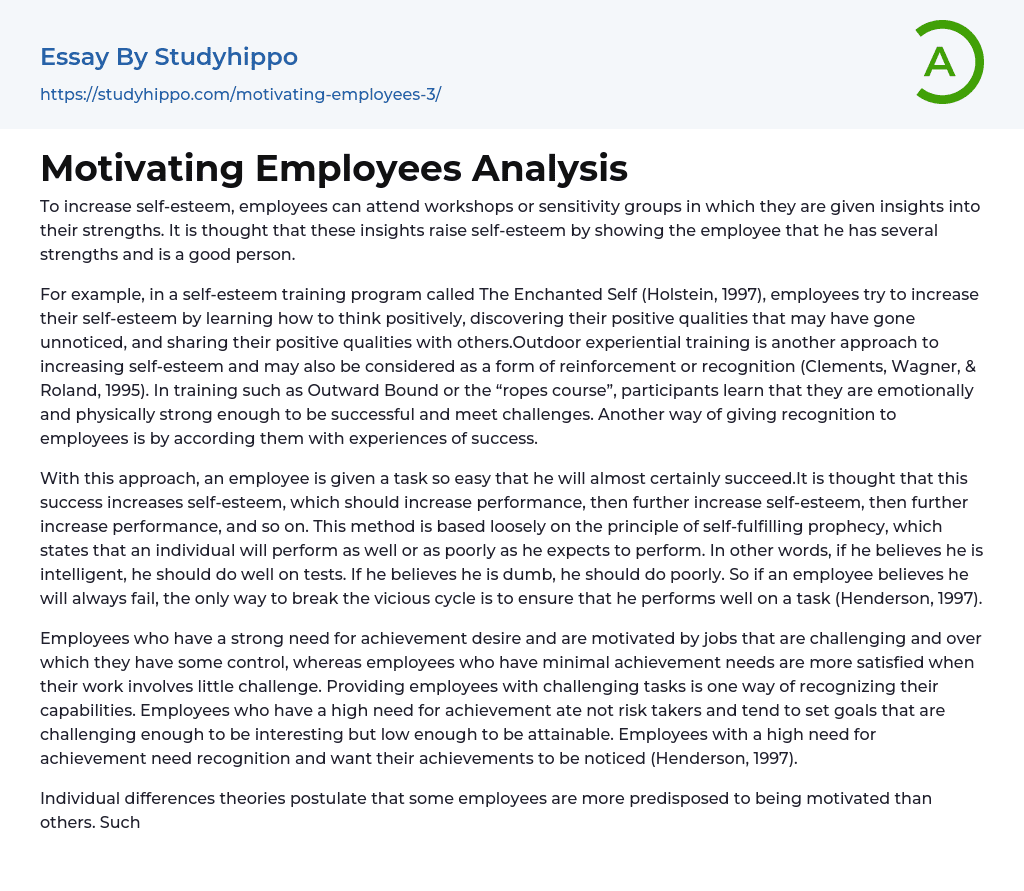Engaging in workshops or sensitivity groups can offer employees valuable understanding of their strengths, ultimately boosting their self-esteem.
The goal of the insights provided is to enhance employees' self-esteem by emphasizing their strengths and validating their value. An example of this is The Enchanted Self (Holstein, 1997), a program that promotes self-esteem by encouraging employees to adopt a positive mindset, uncover overlooked positive qualities, and share them with others. Another approach involves outdoor experiential training like Outward Bound or a "ropes course" to demonstrate participants' ability to overcome challenges and achieve success. Additionally, assigning tasks that are likely to be accomplished can acknowledge employee achievements and ultimately boost their self-esteem. This method is based on the concept of self-fulfilling prophecy where an individual's performance is influenced by their own expectations.
The beliefs an employee holds about th
...eir intelligence significantly impact their performance. If they view themselves as intelligent, they are likely to excel in tests. Conversely, if they see themselves as unintelligent, their performance is likely to suffer. Breaking this cycle of negativity is crucial for employees who consistently believe in their failure. One effective approach to accomplish this is by ensuring that they excel in a task (Henderson, 1997).
Individuals with a strong need for achievement often pursue challenging jobs where they have control over the tasks at hand. On the other hand, those with minimal achievement needs find satisfaction in less demanding work. Assigning employees challenging tasks can help them recognize and utilize their capabilities effectively. Individuals with a high need for achievement prefer setting goals that are both challenging and attainable.
Employees with a high need for achievement desire recognition and acknowledgement of their accomplishments (Henderson
1997). Theories on individual differences propose that certain employees are naturally more inclined to be motivated than others, with factors such as genetics and affectivity influencing job satisfaction levels. However, instead of genetics and affectivity, self-esteem, need for achievement, and tendency for intrinsic motivation are the individual differences most strongly associated with work motivation. It has been scientifically verified that there are inherent differences between men and women (Ridley, 1999).
Men and women have different motivational styles. Men typically rely on basic needs and tangible rewards to motivate, while women may be better at using higher levels of needs and intangible factors (Gerstner, 2002). However, all managers, regardless of gender, should combine various motivational tools. One of the most effective tools is providing timely, constructive feedback (Sachs, 1995).
In times of change, effective motivation requires a combination of emotional and intellectual levers, such as frequent feedback and recognition. Managers should use and combine multiple needs, factors, modes of reinforcement, and outputs in their messages to motivate employees and assess their job performance (Ridley, 1999).
To become a good motivator, managers need to understand which motivational tools or levels work for each employee and learn how to effectively motivate and communicate through positive reinforcement – by providing positive feedback and recognition (Ridley, 1999).
- Reinforcement essays
- Archetype essays
- Maturity essays
- Deception essays
- Certainty essays
- Conformity essays
- Aggression essays
- Behavior essays
- Human Behavior essays
- Obedience essays
- Adult essays
- Procrastination essays
- Morality essays
- Altruism essays
- Human Sexuality essays
- Role Model essays
- Perseverance essays
- Expressive essays
- Character Traits essays
- Apology essays
- Compassion essays
- Self Assessment essays
- Self Evaluation essays
- Immigration Reform essays
- Abnormal Psychology essays
- Abraham Maslow essays
- Attachment Theory essays
- Authority essays
- Behaviorism essays
- Classical Conditioning essays
- Cognitive Psychology essays
- Counseling essays
- Developmental Psychology essays
- Educational Psychology essays
- Erik Erikson essays
- Family Therapy essays
- Jean Piaget essays
- Maslow's Hierarchy Of Needs essays
- Mental Health essays
- Operant Conditioning essays
- Personality Psychology essays
- Positive Psychology essays
- Psychoanalysis essays
- Psychotherapy essays
- Sigmund Freud essays
- Social Psychology essays
- Stanford Prison Experiment essays
- Supersize Me essays
- Career Choice essays
- Career Goals essays




